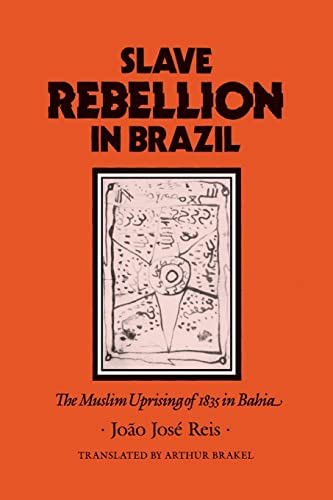Slave Rebellion in Brazil
The Muslim Uprising of 1835 in Bahia (Johns Hopkins Studies in Atlantic History and Culture)
João José José Reis
BOOK REVIEW

The profound and transformative exploration found within Slave Rebellion in Brazil: The Muslim Uprising of 1835 in Bahia by João José Reis invites readers into an electrifying chapter of history that still resonates with power and relevance today. This meticulously researched text does more than recount the events of one of the most significant slave uprisings in Brazil; it thrusts into the forefront the undercurrents of resistance and the indomitable spirit of those who dared to challenge their oppressors.
Picture it: Bahia in 1835-an explosive mix of cultures, religions, and class struggles culminates in a fierce uprising led by enslaved Muslims. Reis delves into this intricate tableau that is not just about rebellion, but a profound fight for dignity and agency. The uprising stands as a bold proclamation that oppression cannot stifle the human spirit. Reis brings to light personal narratives, testimonies, and social dynamics that encapsulate the raw emotions of this explosive historical moment. If you've ever thought history was dry or disconnected, think again; Reis's prose shimmers with life, pulsating with the heartbeat of the past.
But why should you care about this specific uprising? Beyond the gripping tales of conflict, what Reis articulates is a narrative of identity and faith. The Muslim uprising sheds light on the complex interplay of religion, culture, and resistance against a backdrop of colonial brutality. It offers a powerful lens through which contemporary readers can examine ongoing social justice movements. The echoes of these past struggles reverberate in today's fight against systemic oppression and racism, reminding us of the importance of standing up against injustice in any form.
Reis's work is more than just a recounting of anger and rebellion. It's an analytical gem that digs deep into the social fabric of 19th-century Brazil, making compelling connections between the oppression of the past and the contemporary struggles for civil rights. His exploration elucidates how cultural identities shaped the revolt, and how those enslaved individuals sought not only liberation but also a reclamation of their spiritual and cultural heritage. This book is a clarion call, demanding attention and reflection on how history often repeats itself in echoing cycles of resistance.
Freedom is depicted here not merely as a physical state but a complex emotional and spiritual journey. Reis doesn't shy away from the brutality-he bares the scars of history and invites you to witness the pain and resilience of those who fought. Readers are thrust into fierce debates about agency, power, and compromise that occurred within the enslaved communities. It forces you to grapple with uncomfortable truths about colonialism and oppression, challenging deeply-held beliefs about history and progress.
Nevertheless, the reactions to Reis's work have not been without contention. Some critics argue that his portrayal may overly romanticize the resistance, while others feel it lacks enough exploration of the broader socio-political dynamics at play. Yet, it is precisely these discussions that this groundbreaking work incites-inviting readers to engage not just with the content, but also with the implications of resistance narratives in shaping our understanding of identity and solidarity today.
Ultimately, Slave Rebellion in Brazil is not just an academic text; it's an urgent reminder of the necessity of resistance, the value of understanding our collective past, and the ongoing struggles against oppression that narratives like this illuminate. This book will not let you passively turn its pages; it ignites a fire that demands action, understanding, and empathy.
So, consider this your wake-up call. Dive into Reis's powerful narrative, and let the voices of the past inspire your present. The lessons here are profound, echoing through time and demanding a response. Are you ready to listen? 📣
📖 Slave Rebellion in Brazil: The Muslim Uprising of 1835 in Bahia (Johns Hopkins Studies in Atlantic History and Culture)
✍ by João José José Reis
🧾 281 pages
1995
#slave #rebellion #brazil #muslim #uprising #1835 #bahia #johns #hopkins #studies #atlantic #history #culture #joao #jose #jose #reis #JoaoJoseJoseReis